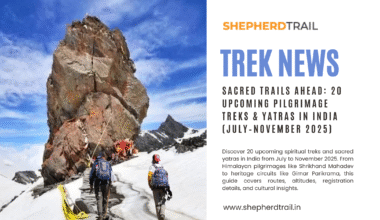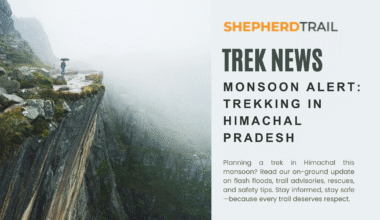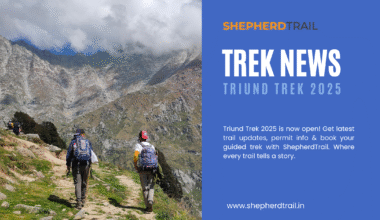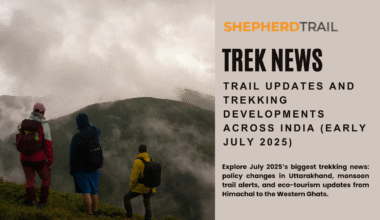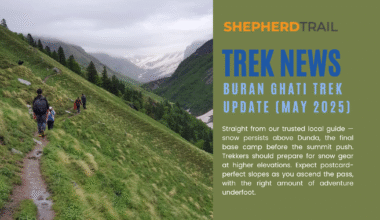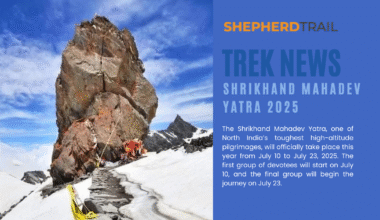Preserving Paradise: Government Initiatives to Safeguard Triund Trek
I remember my college days and how Triund Trek encouraged me to take trekking as a hobby and how it transformed my life! I have documented my experience here. I can bet that for most of you Triund Trek has been a “Pehla Pehla Pyar” moment with Treks 🙂
Back in 2014 when I visited Triund Trek for the first time it was a lesser-known trek as compared to today and things changed over the last 10 years. Notably, it has become a celebrity (yes you heard me right) trek & was even hiked by Indian Cricket Team members recently.
From my links and friends in Dharamshala, I often hear news of Triund being flooded with trekkers with no space to stay even after there are multiple attempts made by govt. in past to limit footfall on the Triund trek.
Triund Trek further links to Indrahar Pass and is one of the main sources of income for people staying in the vicinity.
In a move to protect and limit the impact on the fragile ecosystem of the Triund Trek, the Eco-Tourism Society of the Forest Department has implemented a fee of Rs 200 per person for trekkers heading to Triund. This decision, made during a meeting on November 23, also involves capping the daily number of trekkers at 400 and allowing only 20 tents at the summit. Additionally, a charge of Rs 1,000, plus GST, will be applied to those staying overnight, with a maximum limit of 40 tourists.
While these regulations have been met with opposition from adventure tourism advocates, they hold the promise of positive environmental outcomes. Here are a few reasons why the governments must have taken this decision:
1. Conservation of Ecosystem:
By limiting the number of trekkers and tents, the government aims to minimize the ecological footprint on Triund. This move is crucial in preserving the delicate balance of flora and fauna in the region.
2. Infrastructure Improvement:
The funds generated from the imposed fees will be utilized to enhance the trekking infrastructure. This includes improving the trail and providing better facilities for the trekkers, contributing to a more sustainable and enjoyable experience.
“The money generated from the fee would be used to improve the trek and provide better facilities for tourists.” – Dinesh Kumar, DFO Dharamsala, Member of Eco Tourism Society
3. Regulation Following Court Order:
The rules have been framed in response to an order from the Himachal High Court, emphasizing the need to regulate tourism on the Triund summit. This ensures that the implementation is not arbitrary but a response to legal directives.
“The rules have been framed on the order issued by the Himachal High Court to regulate tourism on Triund summit.” – Dinesh Kumar, DFO Dharamsala, Member of Eco Tourism Society
4. Financial Support for Conservation:
The collected fees serve a dual purpose—limiting the number of visitors and providing financial support for the conservation efforts. This model encourages responsible tourism and contributes to the maintenance of the trekking trails.
5. Balancing Adventure Tourism and Conservation:
While adventure tourism providers express concerns about the impact on their business, finding a balance between revenue generation and environmental preservation is crucial. The proposed fee structure, though contested, reflects an attempt to strike this delicate equilibrium.
6. Addressing Concerns and Collaboration:
The feedback from adventure tourism stakeholders, including the hotel and restaurant association, has prompted discussions on revisiting the fee structure. This collaborative approach ensures that concerns are heard, and adjustments can be made to accommodate various stakeholders.
“Understanding the need for revenue generation and maintenance of the trekking trails, we propose a reduced fee of Rs 50 per person for the entry permit. We have requested the Forest Department to re-evaluate the tent pitching charges.” –Ashwani Bamba, President of Hotel and Restaurant Association of Dharamsala
I feel that the government’s initiative to regulate and impose fees on the Triund Trek is a proactive step toward sustainable tourism but at the same time, govt also need to look into finding a better solution as this Trek also serves as a main source of income for a lot of trek & tour operators and give a boost to hotel industry in the area. By addressing concerns, considering revisions, and involving stakeholders in the decision-making process, the authorities should aim to create a model that balances adventure tourism with the crucial need for environmental conservation.
What are your views on this? Do comment below.


